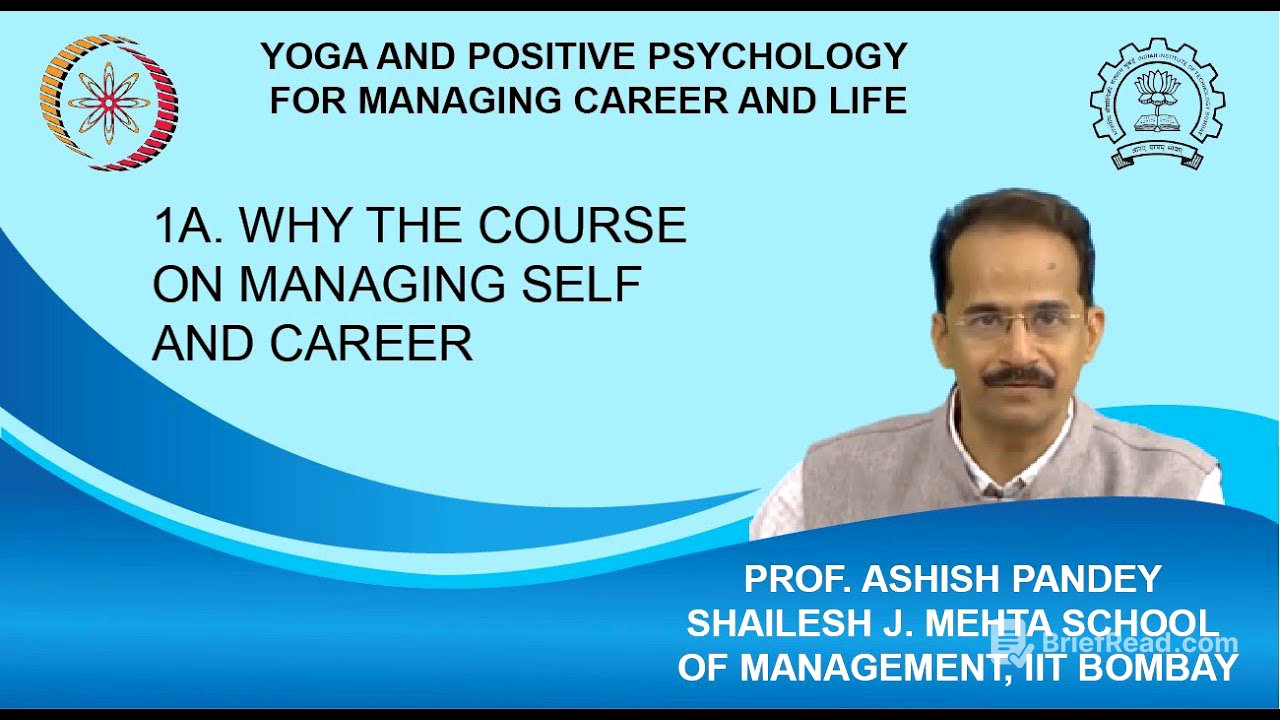TLDR;
This session introduces a course combining yoga and positive psychology for career and life management. It highlights the course's origins, objectives, and potential benefits, framing it as a way to "engineer" or "manage" one's career and life effectively. The discussion includes stories and case studies illustrating the importance of self-management and the impact of one's internal state on external achievements.
- The course aims to provide tools for managing oneself, contrasting with traditional education's focus on external management.
- Stories of Adam Neumann (WeWork), Sachin Bansal (Flipkart), and anecdotes from positive psychology pioneers Martin Seligman and Mihaly Csikszentmihalyi are used to illustrate key concepts.
- The session argues for the necessity of studying self-management as a core component of education.
Course Introduction: Yoga and Positive Psychology [0:15]
The speaker introduces a course that combines yoga and positive psychology to help individuals manage their careers and lives. Originating from the School of Management at IIT Bombay, the course has evolved over eight to nine years and is now available on nptel and the Swayam Prabha platform. The course could be called "engineering career in life", "art of managing career and life" or "science of managing life and career". The core pillars of this course are yoga and positive psychology. While positive psychology is an emerging field that gained prominence about 20 years ago, the course also incorporates the broad perspective of Indian psychology, drawing from Indian traditions and culture to address fundamental questions about leading a good and successful life.
Case Study 1: Adam Neumann and WeWork [4:05]
The first story is about Adam Neumann, the co-founder of WeWork, a company that provides shared workplaces. WeWork's valuation reached $50 billion pre-IPO, but during the IPO process, a thorough audit revealed the company's actual value to be around $9 billion. This drastic devaluation was attributed to Neumann's whims and frenzies, with examples such as charging $185 million in consulting fees to his own company. Despite its initial success, WeWork continues to incur losses of around $2 billion per fiscal year. Neumann's aspirations included living forever, becoming the world's first trillionaire, expanding WeWork to Mars, and becoming the prime minister of Israel and president of the world. These endeavours were largely directed towards building his own brand and reflect a narcissistic attitude, neglecting crucial business variables.
Case Study 2: Sachin Bansal and Flipkart [8:02]
The second story focuses on Sachin Bansal, the co-founder of Flipkart, an Indian e-commerce company. Founded in 2007, Flipkart started by selling books online and was recognised as a promising startup. By the time of this recording, Flipkart's valuation exceeds $35 billion. Sachin Bansal, who served as CEO until 2016, sold his stake in the company when Walmart acquired a significant share. After leaving Flipkart, Bansal took time off to focus on his personal well-being, losing about 25 kg and improving his health. He then founded Navi, a company aspiring to be a universal digital bank in India. Within three years, Navi became profitable, and Bansal credits daily meditation and yoga as his primary stress-relieving activities.
Positive Psychology: Stories from the Founders [11:41]
The speaker references the special issue of the American Psychologist in 2001, which significantly boosted the field of positive psychology. Martin Seligman shares a story about his young daughter, who, at age five, reflected on her past whining and decided to change her behaviour, inspiring Seligman to address his own grouchiness. Mihaly Csikszentmihalyi, known for his work on "flow" (the feeling of immersion and timelessness in an activity), observed that some World War II veterans, despite losing social support, regained their purpose and rebuilt their lives, demonstrating resilience.
The Importance of Self-Management [15:43]
These stories illustrate that self-management is a conscious choice. While most educational courses focus on managing external factors like money, materials, and technology, there are few opportunities to learn about managing oneself. Human beings manage all these external resources, and their minds and emotions significantly influence the quality of this management. Therefore, there is a need for systematic study on managing the self, making it a compulsory and critical aspect of education, similar to maths or science.









